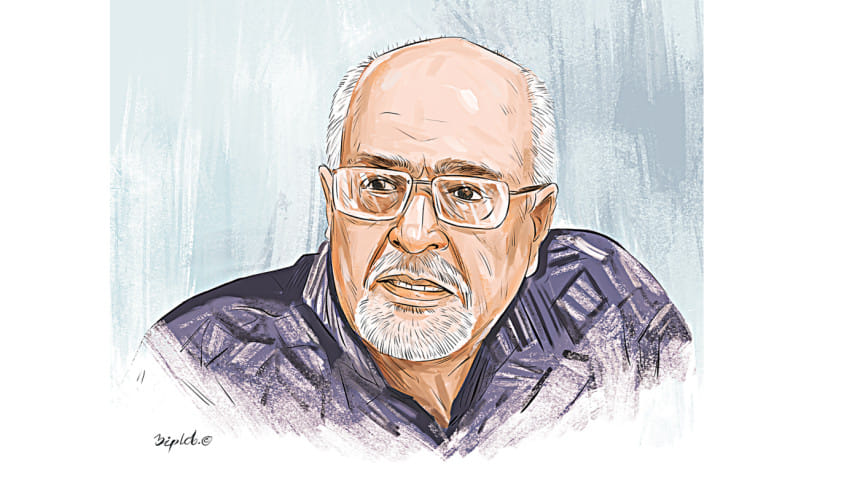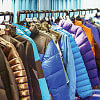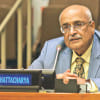Seize opportunity in US apparel market amid tariff shifts

Bangladesh has a strategic opportunity to strengthen its position in the US apparel market as major competitor countries face higher tariffs and growing risks, said Debapriya Bhattacharya, a distinguished fellow at the Centre for Policy Dialogue (CPD).
"A rational option could be eliminating para-tariffs, like supplementary duties and regulatory duties, which would lower effective import tariffs and signal goodwill toward US trade concerns," he said.
Speaking at a seminar titled "US Reciprocal Tariffs and the Way Forward for Bangladesh", hosted by the Dhaka Chamber of Commerce & Industry (DCCI) yesterday, Bhattacharya proposed strategic reforms to enhance competitiveness.
He emphasised the importance of leveraging crises for reform. "A crisis should be regarded as an opportunity," he said. "Reciprocal tariffs, though intended as fair, ultimately burden end consumers and undermine competitiveness.
"There is no final enemy in trade – commerce flows where profit lies," he added, advocating for pragmatism in policy and diplomacy.
Beyond the ready-made garment sector, Bhattacharya identified leather and pharmaceuticals as key areas with untapped export potential. He also warned of macroeconomic vulnerabilities if trade wars trigger competitive currency devaluations.
Addressing concerns over the country's upcoming graduation from least developed country status, he dismissed fears of an immediate shock. "Graduation itself won't cause a crisis. The real test lies in strategic readiness and pragmatic policymaking."
Bhattacharya also called on the government to engage more seriously in service-sector trade talks, pointing out that the US remains a vital but under-leveraged market for Bangladesh.
Mahbubur Rahman, commerce secretary, said Bangladesh is committed to narrowing its trade deficit with the US by increasing imports of goods and services from the world's largest economy.
"Following the US tariff imposition, we have responded quickly and responsibly."
On facilitating cotton imports from the US, Rahman said a warehouse could be established in Bangladesh to streamline delivery. He also highlighted a long-term LNG import deal with the US that is expected to boost bilateral trade by nearly $1 billion.
"Imports of US-origin goods via third countries should be recognised as direct imports in trade discussions," he added.
Mahbubur Rahman, president of the International Chamber of Commerce-Bangladesh (ICCB), urged the government to continue negotiations and criticised the US for unilaterally imposing tariffs. "This contradicts WTO norms."
He also expressed concern over weak public-private dialogue and suggested diversifying exports beyond traditional markets by focusing on Asia, the Middle East, and Africa.
Abul Kasem Khan, chairperson of Business Initiative Leading Development (BUILD), called for exploring a free trade agreement (FTA) with the US. "Policy support is essential for export diversification," he said, also urging the formulation of a strategic roadmap for tapping new markets.
Md Mezbaul Haque, executive director of the Bangladesh Bank, said the recent US tariffs could spark a price war, forcing local industries to increase efficiency. "Our competitiveness is already under pressure due to high financing and energy costs," he said.
To support exporters, the central bank is offering Export Facilitation (EF) funds at a subsidised 5 percent interest rate, Haque added.
M Masrur Reaz, chairman and CEO of the Policy Exchange Bangladesh, termed the US tariff action "more political than commercial". He criticised the government's limited response beyond a formal letter and urged a more informed, strategic approach.
"Our import demand for US-origin cotton, soybean, and LNG is growing — these must be included in bilateral talks," he said. Reaz also underlined the need to improve logistics, noting that Bangladesh's costs are significantly higher than those of regional peers.
Shams Mahmud, a former DCCI president, cautioned that higher US tariffs could reduce demand for Bangladeshi products, intensifying competition for export orders.
He reiterated the need to count US-origin goods imported via third countries as direct imports during trade negotiations. Mahmud also called for urgent improvement in the business environment, particularly in ensuring uninterrupted power supply to industrial zones.
Razeeb Haider, director of the Bangladesh Textile Mills Association, said textile production has dropped nearly 45 percent due to declining gas pressure in factories. He added that while US cotton is of premium quality, it is costly and takes over three months to arrive, which deters importers.
"If the US establishes warehouse facilities here, our cotton imports could increase fourfold," Haider suggested.
Taskeen Ahmed, president of the DCCI, described Bangladesh as standing at a "critical crossroads" shaped by shifting global trade dynamics. He called for urgent reforms, including trade facilitation improvements, exploring FTAs, boosting digital competitiveness, and enhancing skills development.
"To navigate this uncertain landscape, we need immediate and long-term actions," Ahmed said. "Most importantly, a well-coordinated public-private partnership is essential to tackle tariff challenges without delay."

 For all latest news, follow The Daily Star's Google News channel.
For all latest news, follow The Daily Star's Google News channel. 







Comments